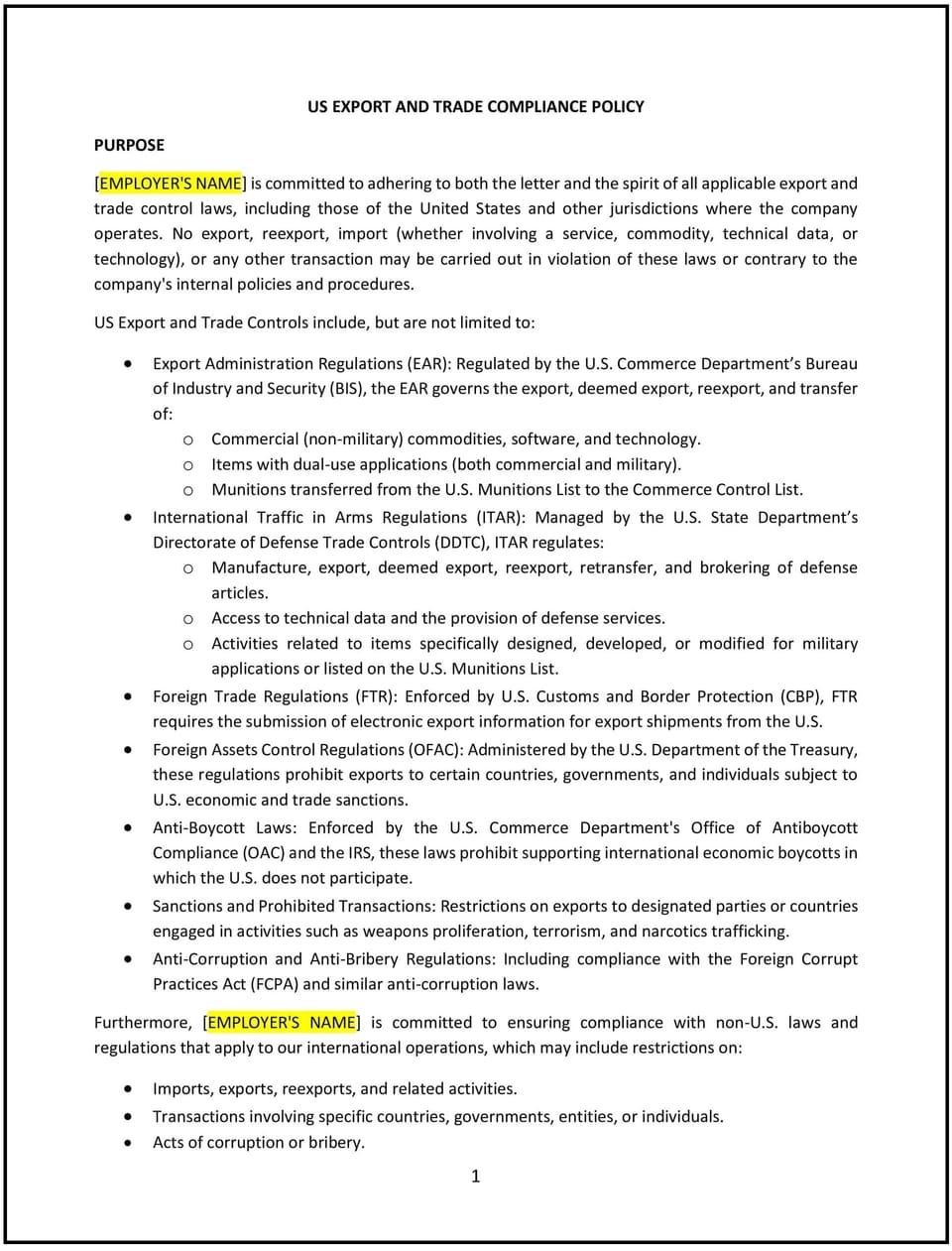US export and trade compliance policy (Illinois): Free template

US export and trade compliance policy (Illinois)
This US export and trade compliance policy is designed to help Illinois businesses ensure adherence to US export control laws and trade regulations, including those enforced by the Bureau of Industry and Security (BIS), the Office of Foreign Assets Control (OFAC), and the International Traffic in Arms Regulations (ITAR). The policy outlines guidelines for managing exports, imports, and trade activities to avoid violations and ensure lawful operations.
By adopting this policy, businesses can minimize risks, maintain compliance, and support ethical trade practices.
How to use this US export and trade compliance policy (Illinois)
- Define key regulations: Specify the laws and regulations that govern export and trade compliance, such as EAR, ITAR, and OFAC sanctions.
- Outline employee responsibilities: Clarify roles and responsibilities for compliance, including reporting potential violations and ensuring due diligence.
- Include screening procedures: Require screening of customers, vendors, and partners against restricted or prohibited lists, such as the OFAC SDN List.
- Address export controls: Specify procedures for classifying items, obtaining licenses, and verifying end-use and end-users.
- Emphasize training: Provide regular training for employees on compliance requirements and how to identify potential red flags.
- Establish recordkeeping requirements: Specify how long records related to exports, imports, and trade activities must be retained, following US and Illinois laws.
- Detail reporting processes: Outline how to report suspected violations internally and to the appropriate authorities.
- Monitor compliance: Conduct regular audits to ensure adherence to export and trade regulations and company policies.
Benefits of using this US export and trade compliance policy (Illinois)
This policy provides several benefits for Illinois businesses:
- Enhances compliance: Aligns with federal and Illinois laws to avoid legal and financial penalties.
- Reduces risks: Minimizes the risk of fines, sanctions, or reputational damage due to non-compliance.
- Promotes ethical practices: Supports responsible trade by ensuring transactions meet legal and ethical standards.
- Provides clarity: Establishes clear procedures for managing exports, imports, and trade-related activities.
- Improves accountability: Clarifies roles and responsibilities, ensuring employees understand their obligations.
Tips for using this US export and trade compliance policy (Illinois)
- Communicate the policy: Share the policy with employees and ensure it is included in onboarding materials and accessible in the employee handbook.
- Train employees: Provide regular training on export and trade compliance requirements, including updates on regulatory changes.
- Use compliance software: Implement tools to assist with screening, classification, and recordkeeping for export and trade activities.
- Establish a compliance officer: Designate a point of contact to oversee compliance efforts and provide guidance on regulatory matters.
- Update regularly: Revise the policy to reflect changes in federal and Illinois trade regulations or company practices.
Q: What laws and regulations does this policy address?
A: This policy addresses US export and trade regulations, including EAR, ITAR, and OFAC sanctions, as well as Illinois-specific trade compliance practices.
Q: Who is responsible for ensuring compliance?
A: Compliance is a shared responsibility among employees, with oversight from designated compliance officers or managers.
Q: What are the requirements for screening customers and vendors?
A: Customers and vendors must be screened against restricted or prohibited lists, such as the OFAC SDN List, to ensure compliance with US trade laws.
Q: How are export-controlled items classified?
A: Items are classified based on the US Commerce Control List (CCL) or US Munitions List (USML) to determine licensing requirements.
Q: What happens if a violation occurs?
A: Suspected violations must be reported internally and to the appropriate regulatory authorities. Consequences may include fines, sanctions, or other penalties.
Q: How long should records be retained?
A: Records related to export and trade activities should be retained for at least five years or longer if required by US or Illinois laws.
Q: Are employees trained on compliance requirements?
A: Yes, employees receive regular training on export and trade compliance to ensure they understand their responsibilities and how to avoid violations.
Q: How often is this policy reviewed?
A: This policy is reviewed annually or whenever significant changes occur in US or Illinois trade regulations.
This article contains general legal information and does not contain legal advice. Cobrief is not a law firm or a substitute for an attorney or law firm. The law is complex and changes often. For legal advice, please ask a lawyer.


